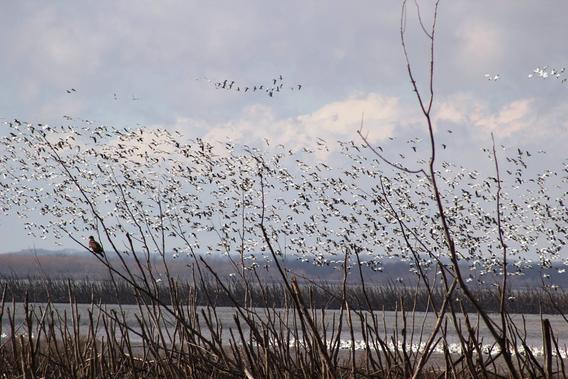
Climate change remains a novel, unprecedented challenge to natural resource managers.
Challenge: Natural resource managers face difficult decisions for integrating climate vulnerability to conserve and manage fish, wildlife, and their habitats due to overwhelming information and diminishing financial resources
Principal Investigator(s):
- Max Post van der Burg (U.S. Geological Survey)
Co-Investigator(s):
- John Delaney (U.S. Geological Survey)
- Kristen Bouska (U.S. Geological Survey)
- Heidi Roop (University of Minnesota)
- Josh Booker (U.S. Fish and Wildlife Service, Region 3)
Cooperator/Partner(s):
- Andrew Allstadt (U.S. Fish and Wildlife Service, Region 3)
- Jaymi Lebrun (U.S. Fish and Wildlife Service, Region 3)
- Josh Eash (U.S. Fish and Wildlife Service, Region 3)
- Jeanne Holler (U.S. Fish and Wildlife Service, Region 3)
Climate change presents new and compounding challenges to natural resource management. With shifting climate patterns, managers are confronted with difficult decisions on how to minimize climate impacts to habitats, infrastructure, and wildlife populations. Further, managers lack the information needed to make proactive management decisions. To address this problem, this project will develop a decision and adaptation framework to support site‐level decision‐making that facilitates thoughtful integration of climate change information into formal management and planning processes.
In collaboration with the U.S. Fish and Wildlife Service (USFWS) National Wildlife Refuge System (NWRS), the proposed framework will integrate refuge management objectives and available climate science to consider and assess a range of management alternatives. The approach will be piloted at three National Wildlife Refuges in the form of multiday workshops. The workshops will be designed to translate climate projections into refuge management impacts, identify adaptation strategies that range from resisting change to directing change, and evaluate these strategies for meeting the suite of refuge management objectives.
As a result, the proposed project will provide an approach to help resource managers make informed decisions on how to best prepare for the future. The authors will develop an instructional workbook targeted for USFWS NWRS use and will present results to refuge managers, biologists, and leadership. While this project is focused on workflows for stations in the Midwest, results will be shared nationally as the ultimate goal is for the USFWS to adopt this approach and standardize a means of addressing climate change across the NWRS.
Read more from the CASC Project Explorer.
